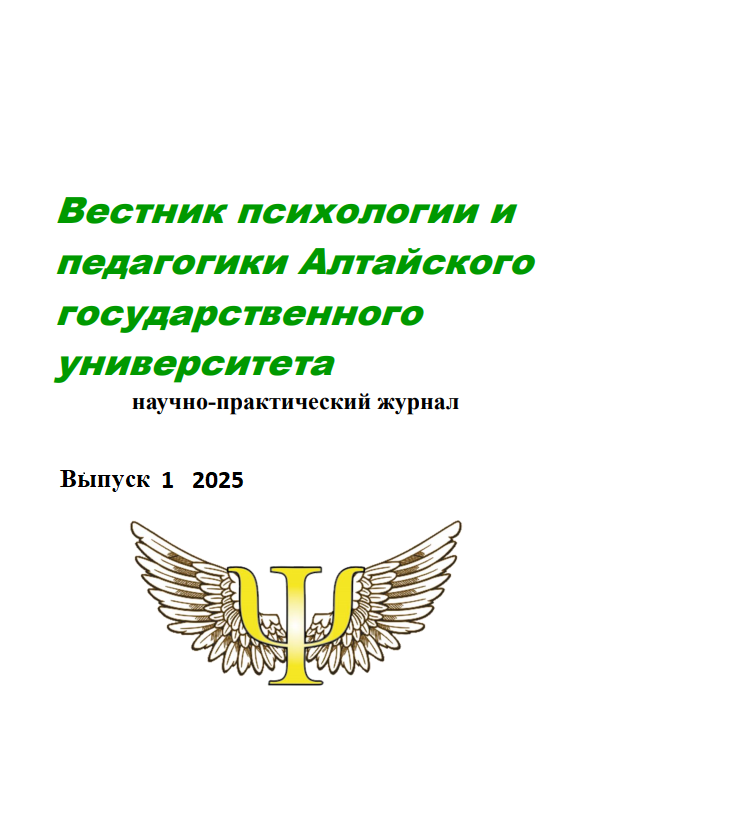PRECRASTINATION: AN EXAMINATION OF INTERNATIONAL RESEARCH PERSPECTIVES
УДК 159.923
Abstract
The article provides a comprehensive review of international psychological studies concerning the phenomenon of precrastination. This issue has garnered increasing attention within the field of psychological science over the past decade, yet remains inadequately explored. Precrastination is defined as the inclination to complete tasks at the earliest opportunity, often resulting in irrational decision-making and the unnecessary expenditure of physical resources. The article includes succinct descriptions of various experiments aimed at investigating the dynamics of precrastination.
Downloads
References
Adachi M., Adachi K. Procrastination and Precrastination from the Perspective of Self-Control. Japanese Psychological Research. 2024. Vol. 66. Nо 2. P. 178-194. URL: https://onlinelibrary.wiley.com/doi/pdf/10.1111/jpr.12495
Bieleke M., Goetz T., Krannich M., Roos A.L., & Yanagida T. Starting tests with easy ver sus difficult tasks: Effects on appraisals and emo tions. Journal of Experimental Education. 2023. 91(2). P. 317–335. URL: https://doi.org/10.1080/00220973.2021. 1947764
Blinch J., DeWinne C.R. Pre-crastination and procrastination effects occur in a reach-to-grasp task. Experimental Brain Research. 2019. Vol. 237. Nо 5. P. 1129-1139. URL: https://disk.yandex.ru/d/PPrY0z2ZA9l9IQ
Ibrahim F., Münscher J.C., & Herzberg P.Y. The facets of an impostor-development and validation of the impostor-profile (IPP31) for measuring impostor phenomenon. Current Psychology. 2022. 41(6), P. 3916–3927. URL: https://doi.org/10. 1007/s12144-020-00895-x
Fournier L.R., Coder E., Kogan C. et al. Which task will we choose first? Precrastination and cognitive load in task ordering. Attention, Perception, & Psychophysics. 2018. Vol. 81. Nо 2. P. 489–503. URL: https://link.springer.com/content/pdf/10.3758/s13414-018-1633-5.pdf
Gehrig Ch., Münscher J-Ch., Herzberg P.Y. How do we deal with our daily tasks? Precrastination and its relationship to personality and other constructs. Personality and Individual Differences. 2023. Vol. 201, 111927.
URL: https://doi.org/10.1016/j.paid.2022.111927
Ma B., Zhang Y. Precrastination and Time Perspective: Evidence from Intertemporal Decision-Making. Behavioral Sciences. 2023. Vol. 13. No. 8. P. 1–12. URL: https://www.mdpi.com/2076-328X/13/8/631
Masih S.N., Jun S.L.R., McBride D.M. Is precrastination related to updating and inhibition aspects of executive function?. Memory. 2024. Vol. 32, Nо 8. P. 1100–1114. https://doi.org/ 10.1080/09658211.2024.2384948. URL: https://www.tandfonline.com/doi/pdf/10.1080/09658211.2024.2384948
Patterson E.E., Kahan T.A. Precrastination and the cognitive-load-reduction (CLEAR) hypothesis. Memory. 2019. Vol. 28, Nо 1. P. 1–5. URL: https://disk.yandex.ru/i/cdYyntmH8niR5w
Raghunath N.; Fournier L.R.; Kogan C. Precrastination and individual differences in working memory capacity. Psychological Research. 2021. No 85, P. 1970–1985. URL: https://link.springer.com/article/10.1007/s00426-020-01373-6
Rosenbaum D.A., Fournier L.R., Levy-Nzedek S. et al. Sooner Rather Than Later: Precrastination Rather Than Procrastination. Current Directions in Psychological Science. 2019. Vol. 28. N. 3. P. 229–233. URL: https://freidok.uni-freiburg.de/files/152441/TiCRmHAjlvmIMqEJ/10.1177_0963721419833652.pdf
Rosenbaum D.A., Gong L., Potts C.A. Pre-Crastination: Hastening Subgoal Completion at the Expense of Extra Physical Effort. Psychological Science. 2014. Vol. 25. No 7. P. 1487–1496. URL: https://content.lesaffaires.com/LAF/lacom/precrastination.pdf
Rosenbaum D.A., Sauerberger K.S. Deciding what to do: Observations from a psycho-motor laboratory, including the discovery of pre-crastination. Behavioural Processes. 2022. Vol. 199. P. 1–37. URL: https://pubmed.ncbi.nlm.nih.gov/35526661/
Rosenbaum D.A., Sauerberger K.S. End-state comfort meets pre-crastination. Psychological Research. 2019. Vol. 83. No 2. P. 205–215. URL: https://disk.yandex.ru/i/E8th4S9hzCt8dA
Sauerberger K. When Doing Things Later Is the Best Choice: Precrastination as an Individual Difference. University of California: Riverside, CA, USA. 2019. URL: https://escholarship.org/uc/item/5wh9d0bw
Rosenbaum D. A., Sturgill H. B., & Feghhi I. Pre-crastination: Extra Physical Effort for Mind-Clearing in Reaching, Walking, and Other Activities. Brazilian Journal of Motor Behavior. 2023. No 17(1), 1–2. URL: https://doi.org/10.20338/bjmb.v17i1.347
VonderHaar R.L., McBride D.M., & Rosenbaum D.A. Task order choices in cognitive and perceptual-motor tasks: The cognitive-load reduction (CLEAR) hypothesis. Attention, Perception, & Psychophysics. 2019. No 81(7), P. 2517–2525. URL: https://doi. org/10.3758/s13414-019-01754-z
Zhu M., Yang Y., & Hsee C.K. The mere urgency effect. Journal of Consumer Research. 2018. No 45(3), P. 673–690. URL: https://doi.org/10. 1093/jcr/ucy008
Bulletin of Psychology and Pedagogy of Altai State University is a golden publisher, as we allow self-archiving, but most importantly we are fully transparent about your rights.
Authors may present and discuss their findings ahead of publication: at scientific conferences, on preprint servers, in public databases, and in blogs, wikis, tweets, and other informal communication channels.
Bulletin of Psychology and Pedagogy of Altai State University allows authors to deposit manuscripts (currently under review or those for intended submission) in non-commercial, pre-print servers such as ArXiv.
Authors who publish with this journal agree to the following terms:
- Authors retain copyright and grant the journal right of first publication with the work simultaneously licensed under a Creative Commons Attribution License that allows others to share the work with an acknowledgement of the work's authorship and initial publication in this journal.
- Authors are able to enter into separate, additional contractual arrangements for the non-exclusive distribution of the journal's published version of the work (e.g., post it to an institutional repository or publish it in a book), with an acknowledgement of its initial publication in this journal.
- Authors are permitted and encouraged to post their work online (e.g., in institutional repositories or on their website) prior to and during the submission process, as it can lead to productive exchanges, as well as earlier and greater citation of published work (See The Effect of Open Access).







